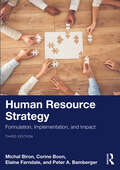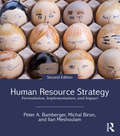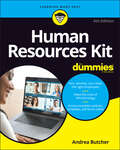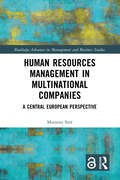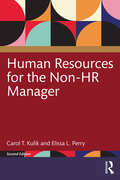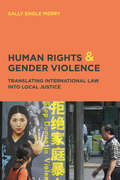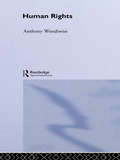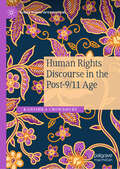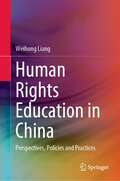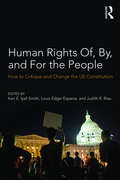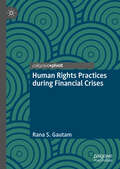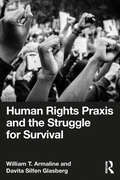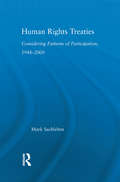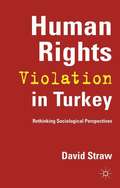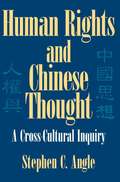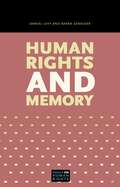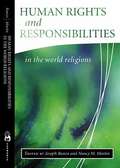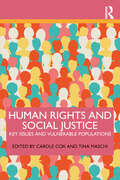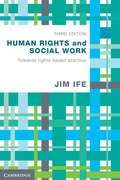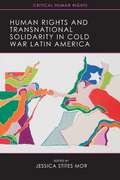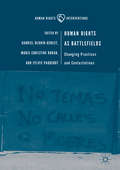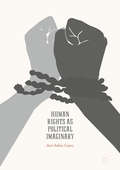- Table View
- List View
Human Resource Strategy: Formulation, Implementation, and Impact
by Michal Biron Peter A. Bamberger Elaine Farndale Corine BoonWhat is Human Resource Strategy? How are human resource strategies formulated and how can we explain the variance between what is espoused and what is actually implemented? What impact – if any – does human resource strategy have on the organization’s “bottom line,” and how can this impact be explained? Is there one best HR strategy for all firms, or is the impact of HR strategy on performance contingent on some set of organizational, technological or environmental factors?Human Resource Strategy, third edition, provides an overview of the academic and practitioner responses to these and other questions. Applying an integrative framework, the authors review over thirty years’ worth of empirical and theoretical research in an attempt to reconcile often-conflicting conceptual models and equivocal empirical findings. The book supports students in applying theory to practice and presents much of the relevant research in the context of the critical strategic decisions that executives are often forced to make with regard to human resource investments and deployments. As a result, often-complex theoretical models and scientific findings are presented such that they are not only understandable but also highly relevant to non-research-oriented practitioners. This new edition includes new chapters on innovations in HR strategies and diversity and introduces more practical examples. This book is an ideal resource for students and practitioners alike.
Human Resource Strategy: Formulation, Implementation, and Impact (Advanced Topics In Organizational Behavior Ser.)
by Ilan Meshoulam Michal Biron Peter A. BambergerWhat is human resource strategy? How are human resources strategies formulated and how can we explain the variance between what is espoused and what is actually implemented? What impact – if any – does human resource strategy have on the organization’s "bottom line," and how can this impact be explained? Is there one best HR strategy for all firms, or is the impact of HR strategy on performance contingent on some set of organizational, technological or environmental factors? Human Resource Strategy, 2nd edition, provides an overview of the academic and practitioner responses to these and other questions. Applying an integrative framework, the authors review 30 years’ worth of empirical and theoretical research in an attempt to reconcile often-conflicting conceptual models and competing empirical results. Complex theoretical models and scientific findings are presented in an accessible and relevant way, in the context of the strategic decisions that executives are forced to make on a regular basis. This new edition features an updated literature review, coverage of the latest challenges to HR strategy, new mini-cases, discussion questions, additional examples, and an emphasis on the strategic implications of the research, making it an ideal resource for students and practitioners alike.
Human Resources Kit For Dummies
by Andrea ButcherThe talent professional’s one-stop reference for best practices and tips Human Resources Kit For Dummies is the guide talent pros turn to for improving their leadership across the businesses they serve. The world of HR is full of unforeseen challenges, and this For Dummies reference will help you to handle them with grace and professionalism. This book provides tips and tricks for creating an engaging employee experience from the get-go, prioritizing employee well-being and health, navigating the recent wave of resignations, and implementing better hiring practices. In this new era of virtual offices, you’ll also learn to implement remote and hybrid onboarding and work models. Plus, you’ll explore HR technologies, learning and development strategies that get results, hiring ethics, diversity and inclusion best practices, social media uses and policies, and beyond. Learn all the functions of the human resources role Discover new software, HR best practices, and employment trends Make your organization more ethical with diversity, equity, and inclusion initiatives Get insights on how to navigate remote workers and other common HR challenges New and working HR professionals will love this friendly, easy-to-read resource for developing HR skills. If you’re a business owner, this book can also help you recruit, hire, and retain the right people, or build an HR function that gets results!
Human Resources Management Success: The Ulrich Collection (3 Books)
by Dave Ulrich Brian E. Becker Mark A. Huselid Wayne BrockbankThis digital collection, curated by Harvard Business Review, includes three important books by experts in the human resources field-The HR Scorecard, The HR Value Proposition, and Human Resource Champions. Learn how individuals in human resources can partner with line managers to make organizations more competitive, how HR impacts business performance, and how HR leaders can bring substantial value to internal and external stakeholders.
Human Resources Management in Multinational Companies: A Central European Perspective (Routledge Advances in Management and Business Studies)
by Marzena StorHuman resource management (HRM) has a significant impact on companies' performance, as evidenced by research conducted in multinational companies (MNCs) based in Central Europe. This book provides a unique perspective of activities conducted in the HRM field in local subsidiaries of such enterprises. It also presents results verifying many hypotheses for each of the six models for single HRM subfunctions and their four relationships with the results of company performance. Particular chapters are devoted to activities including staffing the organization, shaping employee work engagement and job satisfaction, conducting employee performance appraisal, employee development, managerial staff development, and employer branding. The author used the Partial Least Squares Structural Equation Modeling to verify the research hypotheses. Readers will acquire knowledge about HRM practices in organizations in which the overwhelming ownership capital belongs to MNCs headquartered in Central Europe. The research findings presented confirm the positive impact that HRM activities have on the results of this type of enterprise in such areas as finance, quality, innovation and HRM itself. The research also sheds light on the new, interesting regularities identified in this regard, e.g. the perception of human factor as a competitive factor. This book will be of interest to academics, researchers, and advanced or postgraduate students who are interested in the latest research on HRM in MNCs in the region of Central Europe.
Human Resources for the Non-HR Manager
by Carol T. Kulik Elissa L. PerryHuman Resources for the Non-HR Manager gives every manager, regardless of their functional role, access to cutting-edge research and evidence-based recommendations so they can approach their people management responsibilities with confidence. Day-to-day people management is increasingly the responsibility of front-line managers, not HR professionals. But managers are often poorly prepared for these responsibilities; they receive little training (and sometimes have little interest!) in HR. People management is never easy, and it is particularly challenging in COVID-19’s "next normal" workplace, where managers must engage diverse employees across a wide range of working arrangements. This book focuses on the special relationship that line managers have with their employees and describes managers’ responsibilities across the entire employee lifecycle – from front-end recruiting and hiring through to long-term retention. The content is grounded in rigorous academic research, but the book’s conversational tone conveys basic principles without technical jargon. Each chapter includes Manager’s Checkpoints to help readers apply the material to their own workplace, and Manager’s Knots that address gray areas inherent in people management. The book is designed for any reader currently working as a line manager, or aspiring to a managerial role, who wants to improve their people management skills.
Human Resources for the Non-HR Manager
by Carol T. Kulik Elissa L. PerryHuman Resources for the Non-HR Manager gives every manager, regardless of their functional role, access to cutting-edge research and evidence-based recommendations so they can approach their people management responsibilities with confidence.Day-to-day people management is increasingly the responsibility of front-line managers, not HR professionals. But managers are often poorly prepared for these responsibilities; they receive little training (and sometimes have little interest!) in HR. People management is never easy, and it is particularly challenging in COVID-19’s "next normal" workplace, where managers must engage diverse employees across a wide range of working arrangements. This book focuses on the special relationship that line managers have with their employees and describes managers’ responsibilities across the entire employee lifecycle – from front-end recruiting and hiring through to long-term retention. The content is grounded in rigorous academic research, but the book’s conversational tone conveys basic principles without technical jargon. Each chapter includes Manager’s Checkpoints to help readers apply the material to their own workplace, and Manager’s Knots that address gray areas inherent in people management.The book is designed for any reader currently working as a line manager, or aspiring to a managerial role, who wants to improve their people management skills.Combined with a complete instructor package, the book provides different types of activities to accompany each chapter: Some Assembly Required, In the News, and Undercover Manager. The activities can be found in the Instructor Resources Download Hub, and are designed to align with student cohorts with varying levels of experience.
Human Rights & Gender Violence: Translating International Law into Local Justice (Chicago Series In Law And Society Ser.)
by Sally Engle MerryHuman rights law and the legal protection of women from violence are still fairly new concepts. As a result, substantial discrepancies exist between what is decided in the halls of the United Nations and what women experience on a daily basis in their communities. Human Rights and Gender Violence is an ambitious study that investigates the tensions between global law and local justice. As an observer of UN diplomatic negotiations as well as the workings of grassroots feminist organizations in several countries, Sally Engle Merry offers an insider's perspective on how human rights law holds authorities accountable for the protection of citizens even while reinforcing and expanding state power. Providing legal and anthropological perspectives, Merry contends that human rights law must be framed in local terms to be accepted and effective in altering existing social hierarchies. Gender violence in particular, she argues, is rooted in deep cultural and religious beliefs, so change is often vehemently resisted by the communities perpetrating the acts of aggression. A much-needed exploration of how local cultures appropriate and enact international human rights law, this book will be of enormous value to students of gender studies and anthropology alike.
Human Rights (Key Ideas)
by Anthony WoodiwissAre human rights part of the problem or part of the solution in the current 'clash of civilizations'? Drawing on a hitherto neglected body of work in classical social theory and combining it with ideas derived from Barrington Moore, Norbert Elias and Michel Foucault, Woodiwiss poses and answers the questions: How did human rights become entangled with power relations? How might the nature of this entanglement be altered so that human rights better serve the global majority? In answering these questions, he explains how and why rights discourse developed in such distinctive ways in four key locations: Britain, the United States, Japan and in the UN. On this basis he provides, for the first time, a general sociological account of the development of international human rights discourse, which represents a striking challenge to current thinking and policy.
Human Rights Discourse in the Post-9/11 Age (Human Rights Interventions)
by Kanishka ChowdhuryThis book offers a materialist critique of mainstream human rights discourse in the period following 9/11, examining literary works, critical histories, international declarations, government statutes, NGO manifestos, and a documentary film. The author points out some of the contradictions that emerge in contemporary rights language when material relations are not sufficiently perceived or acknowledged, and he directs attention to the role of some rights talk in maintaining and managing the accelerated global project of capital accumulation. Even as rights discourse points to injustices—for example, injustices related to labor, gender, the citizen’s relationship to the state, or the movement of refugees—it can simultaneously maintain systems of oppression. By constructing subjects who are aligned to the interests of capital, by emphasizing individual “empowerment,” and/or by containing social disenchantment, it reinforces the process of wealth accumulation, supports neoliberal ideologies, and diminishes the possibility of real transformation through collective struggle.
Human Rights Education in China: Perspectives, Policies and Practices
by Weihong LiangThe book provides new research highlighting perspectives, perceptions, and practices regarding human rights and human rights education in China. It traces the emergence and evolution of the human rights conception and human rights education from comparative perspectives. China’s deeply embedded philosophical and cultural traditions shed light on its ideas of human rights and human rights education. The efforts to construct an independent and strong nation-state since the mid-to-late nineteenth century fashioned the Chinese thinking of rights and citizenship, and the reciprocal relation between the individual and community/state.With the help of collected data, the book unpacks that the goal-making and content-selection of human rights education in China rely heavily on the provisions given by central authorities; however, the practices have different facets depends on how the people perceive and respond those requirements in the school and classroom contexts. The book concludes by explaining the human rights education in China as a socialization project for citizenship-making, and suggests that China’s doctrine on human rights and human rights education is closely associated with cultural relativization and social construction.Though China is just beginning to develop human rights education in its education systems, this study suggests possible direction for future research. How to live with human rights should be included further in schooling, especially how to infuse human rights education into all aspects of school day-to-day life.
Human Rights Of, By, and For the People: How to Critique and Change the US Constitution
by Keri E. Iyall Smith Judith R. Blau Louis Edgar EsparzaTogether, the US Constitution and the Bill of Rights comprise the constitutional foundation of the United States. These—the oldest governing documents still in use in the world—urgently need an update, just as the constitutions of other countries have been updated and revised. Human Rights Of, By, and For the People brings together lawyers and sociologists to show how globalization and climate change offer an opportunity to revisit the founding documents. Each proposes specific changes that would more closely align US law with international law. The chapters also illustrate how constitutions are embedded in society and shaped by culture. The constitution itself sets up contentious relationships among the three branches of government and between the federal government and each state government, while the Bill of Rights and subsequent amendments begrudgingly recognize the civil and political rights of citizens. These rights are described by legal scholars as "negative rights," specifically as freedoms from infringements rather than as positive rights that affirm personhood and human dignity. The contributors to this volume offer "positive rights" instead. The Universal Declaration of Human Rights (UDHR), written in the middle of the last century, inspires these updates. Nearly every other constitution in the world has adopted language from the UDHR. The contributors use intersectionality, critical race theory, and contemporary critiques of runaway economic inequality to ground their interventions in sociological argument.
Human Rights Practices during Financial Crises
by Rana S. GautamFrom the Great Depression in the twentieth century to the Great Recession in the twenty-first, systemic banking crises have been a recurring problem for both developing and developed countries. This book offers a human rights perspective on financial crises vis-à-vis low-income and least developed countries. It systematically analyzes government’s commitment to women’s economic rights and basic human rights during systemic banking crises. The book combines a wealth of data with rich theoretical arguments that weave together distinct but related bodies of literature from international development, human rights, and political economy.
Human Rights Praxis and the Struggle for Survival
by William T. Armaline Davita Silfen GlasbergAsserting a critical sociological perspective, Human Rights Praxis and the Struggle for Survival reveals the contested historical processes through which fundamental human needs are constructed as “rights” under international law, and how those rights are confronted by the ruling relations and crises inherent to contemporary global capitalism and the waning American hegemonic world order.Put simply, the book explores why human rights as a formal legal project has failed to deliver on guaranteeing human survival, let alone universal human dignity. Rather than stopping at critique, the authors propose a specific, materialist intellectual and political agenda for the preservation of collective human survival that can achieve the historically unique notions of common humanity and human emancipation. The authors build on previous work, further developing the sociology of human rights as a distinct field at the intersection of Social Sciences and International Law. They take on several provocative theoretical debates, such as those over connections between racism and capitalism; the existence of a global or “transnational” police state; the control, growth, and exploitation of migrants/migration; and the complex relationship between political repression and various forms of domination.Human Rights Praxis and the Struggle for Survival offers critical analysis of contemporary politics and options for students, scholars, organizers, and stakeholders to grapple with some of the most pressing social problems of human history.
Human Rights Treaties: Considering Patterns of Participation, 1948-2000 (Studies in International Relations)
by Mark SachlebenThe book examines patterns of participation in human rights treaties. International relations theory is divided on what motivates states to participate in treaties, specifically human rights treaties. Instead of examining the specific motivations, this dissertation examines patterns of participation. In doing so, it attempts to match theoretical expectations of state behavior with participation. This book provides significant evidence that there are multiple motivations that lead states to participate in human rights treaties.
Human Rights Violation in Turkey
by David StrawSociological theory has veered between an insistence on understanding human rights as a genuine universal morality and far more cynical portrayals of human rights as a veil of bourgeois capitalist enterprise. This book criticizes, adapts and combines seemingly disparate elements of contemporary sociological theory within a new approach to human rights. The practicality of the approach is clearly demonstrated in its application to one of the most important, complex and vexing locations of human rights violation in the world: modern Turkey. While sociological analyses of Turkey have largely been limited to local perspectives on individual issues of human rights violation, this book expands sociological understanding of the broad swath of Turkey's human rights violations into a new global perspective of hope and resolution.
Human Rights and Chinese Thought: A Cross-Cultural Inquiry
by Stephen C. AngleWhat should we make of claims by members of other groups who have moralities different from our own? Human Rights in Chinese Thought gives an extended answer to this question in the first study of its kind. It integrates a full account of the development of Chinese rights discourse with philosophical consideration of how various communities should respond to contemporary Chinese claims about the uniqueness of their human rights concepts. The book elaborates a plausible kind of moral pluralism and demonstrates that Chinese ideas of human rights do indeed have distinctive characteristics, but it nonetheless argues for the importance and promise of cross-cultural moral engagement.
Human Rights and Memory (Essays on Human Rights #5)
by Daniel Levy Natan SznaiderMemories of historical events like the Holocaust have played a key role in the internationalization of human rights. Their importance lies in their ability to bridge the universal and the particular—the universality of human values and the particularity of memories rooted in local human experiences. In Human Rights and Memory, Levy and Sznaider trace the growth of human rights discourse since World War II and interpret its deployment of memories as a new form of cosmopolitanism, exemplifying a dynamic through which global concerns become part of local experiences, and vice versa.
Human Rights and Responsibilities in the World Religions (Library of Global Ethics & Religion)
by Arvind Sharma Joseph Runzo Nancy M MartinThis book outlines approaches to human rights and responsibilities within the different world religions.
Human Rights and Social Justice: Key Issues and Vulnerable Populations
by Carole Cox Tina MaschiHuman Rights and Social Justice: Key Issues and Vulnerable Populations is a comprehensive text that focuses on central issues of human rights and justice and links them directly with social work competencies and practice. Drawing attention to oppression and multiple forms of disadvantage and discrimination based on a person’s identity and social location, this volume develops an integrated framework to advance human rights and social, economic, and environmental justice with vulnerable populations and communities across all three levels of practice. Each chapter, written by leading scholars in their respective fields, is designed to enhance students’ awareness, knowledge, and understanding of key theories and issues related to diversity, human rights, and equity. Broken into sections providing theory, practice, and case study illustrations, the chapters will first explain and argue that each person, regardless of their position in society, has basic human rights. Students will then see how these knowledges translate into practice through clear and engaging cases that reinforce skills and behaviors that social workers may use to advocate for human rights and ensure that they are distributed equitably and without prejudice. Providing a broad overview of social justice and rights-based challenges and connecting theory to the profession’s core competencies, this book is an excellent companion for social work students and faculty engaged in foundation and advanced courses in practice with individuals, groups, and communities and diversity and oppression.
Human Rights and Social Work
by Jim IfeNow in its third edition, Human Rights and Social Work explores how the principles of human rights inform contemporary social work practice. Jim Ife considers the implications of social work's traditional Enlightenment heritage and the possibilities of 'post-Enlightenment' practice in a way that is accessible, direct and engaging. The world has changed significantly since the publication of the first edition in 2000 and this book is situated firmly within the context of present-day debates, concerns and crises. Ife covers the importance of relating human rights to the non-human world, as well as the consequences of political and ecological uncertainty. Featuring examples, further readings and a glossary, readers are able to identify and investigate the important issues and questions arising from human rights and social work. Now more than ever, Human Rights and Social Work is an indispensable resource for students, scholars and practitioners alike.
Human Rights and Transnational Solidarity in Cold War Latin America
by Jessica Stites MorWith the end of the global Cold War, the struggle for human rights has emerged as one of the most controversial forces of change in Latin America. Many observers seek the foundations of that movement in notions of rights and models of democratic institutions that originated in the global North. Challenging that view, this volume argues that Latin American community organizers, intellectuals, novelists, priests, students, artists, urban pobladores, refugees, migrants, and common people have contributed significantly to new visions of political community and participatory democracy. These local actors built an alternative transnational solidarity from below with significant participation of the socially excluded and activists in the global South. Edited by Jessica Stites Mor, this book offers fine-grained case studies that show how Latin America’s re-emerging Left transformed the struggles against dictatorship and repression of the Cold War into the language of anti-colonialism, socioeconomic rights, and identity.
Human Rights and the Universal Periodic Review
by Hilary Charlesworth Emma LarkingThe Universal Periodic Review is an intriguing and ambitious development in human rights monitoring which breaks new ground by engaging all 193 members of the United Nations. This book provides the first sustained analysis of the Review and explains how the Review functions within the architecture of the United Nations. It draws on socio-legal scholarship and the insights of human rights practitioners with direct experience of the Review in order to consider its regulatory power and its capacity to influence the behaviour of states. It also highlights the significance of the embodied features of the Review, with its cyclical and intricately managed interactive dialogues. Additionally, it discusses the rituals associated with the Review, examines the tendency of the Review towards hollow ritualism (which undermines its aspiration to address human rights violations comprehensively) and suggests how this ritualism might be overcome.
Human Rights as Battlefields: Changing Practices and Contestations (Human Rights Interventions)
by Gabriel Blouin-Genest Marie-Christine Doran Sylvie PaquerotThis book examines human rights as political battlefields, spaces that are undergoing constant changes in which political conflicts are expressed by a translation process within networks of interactions. This translation, in turn, contributes to modifying the scope and understanding of human rights. Ultimately, these battlefields express the legitimacy encounter of different versions of human rights in contemporary political practices. The volume thus challenges both the tendency to minimize the changing nature of human rights as well as the struggles emerging from the use of human rights discourses as a legitimization tool. By shifting the focus on what stakeholders do instead of solely on the origin, nature or foundations of human rights, the authors reveal that human rights are not static objects: they are constantly transformed and, as such, affect the horizon of universal rights.
Human Rights as Political Imaginary
by José Julián LópezIn this book, López proposes the ‘political imaginary’ model as a tool to better understand what human rights are in practice, and what they might, or might not, be able to achieve. Human rights are conceptualised as assemblages of relatively stable, but not unchanging, historically situated, and socially embedded practices. Drawing on an emerging iconoclastic historiography of human rights, the author provides a sympathetic yet critical overview of the field of the sociology of human rights. The book addresses debates regarding sociology’s relationships to human rights, the strengths and limits of the notion of practice, human rights’ affinity to postnational citizenship and cosmopolitism, and human rights’ curious, yet fateful, entanglement with the law. Human Rights as Political Imaginary will be of interest to students and scholars across a range of disciplines, including sociology, politics, international relations and criminology.
